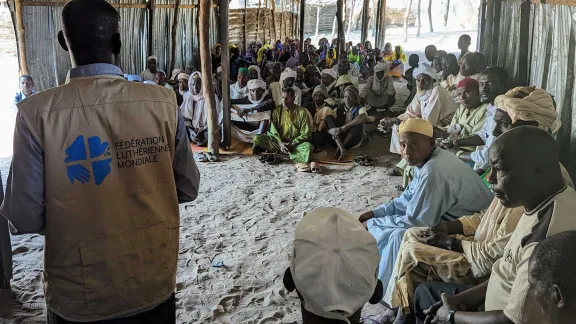LWF General Secretary Burghardt and LWF World Service Director Immonen on World Refugee Day and the state of the world.

Danamadja returnee site, near Goré, Chad. Photo: LWF/M. Renaux
LWF calls for solidarity, action, and accountability
(LWI) On World Refugee Day, LWI met with General Secretary Rev. Dr Anne Burghardt (AB) and Director of World Service Maria Immonen (MI), to discuss the world in which we live.
World Refugee Day is an occasion to look at the state of the world. What stands out for you on this day?
AB: People and communities are currently facing multiple crises of unprecedented complexity: last week close to a hundred people died and even more have been lost at sea in the Mediterranean; school children were abducted and some of them killed in an apparent terrorism incident in Uganda; there is escalating violence in Israel/Palestine; hundreds of people were driven to mass suicide by a cult leader in Kenya; and the military conflict in Sudan is displacing people into neighboring countries that are already fragile.
MI: We should also mention the crisis in Myanmar, which is ongoing, but seems forgotten; Haiti is on the brink of being a collapsed state, unable to provide livelihoods or protection to its citizens, the war in Ukraine continues with regular threats of escalation to nuclear war; extreme weather events including deadly cyclones in India and Brazil; to name just a few.
The LWF issued prayers and a message of solidarity concerning the recent tragic incident in the Mediterranean Sea. What can be done for this never to happen again?
AB: The suffering and deaths of migrants, asylum seekers, and refugees is unacceptable. People who try to make their way to safety across the Mediterranean in the hands of people smugglers must be kept safe. Stringent measures must be taken by the International Community to ensure the safety of migrants, asylum seekers, and refugees, and to apprehend those who make money out of the suffering of people fleeing war and hardship. Furthermore, the governments in the European Union and transit countries must be accountable and responsive to the obligations of international law.
AB: At the heart of each of these crises are people and communities. Some of them are extremely vulnerable due to other challenges such as poverty, human rights violations, or different forms of discrimination. Many of our member churches, partners, and the communities we serve around the world are affected by these crises at the same time as they respond to them. The LWF is also responding in many ways, including through life-saving humanitarian aid, advocacy, accompaniment, solidarity, and prayer.
MI: While our churches and World Service country programs find themselves in these complex crises, it is important to note that they are playing a significant role to supply solutions through their ministries and witness at local, national, and global levels. Our vision for a just, peaceful, and reconciled world is still so relevant during times like these.
Many of the crises that the world is facing currently are humanitarian in nature. What is the global humanitarian sector doing and is it adequate?
MI: Many of these crises are a result of politicians and other leaders not doing their jobs, by allowing differences to escalate to armed conflict and increasing the despair of their citizens resulting in them having to make desperate, life-threatening choices. Meanwhile, the humanitarian sector is struggling because of lack of financial resources that could enable them to adequately support people in need.
Today we are marking World Refugee Day and a record number of more than 108 million people have been forcibly displaced. What is LWF doing to respond?
MI: LWF continues to respond to protracted crises, military conflict, and the effects of climate disasters through its humanitarian and development work. All our programs are working in areas where the needs continue to grow and the resources available to deal with them are inadequate.
We work in Haiti with a population exhausted from decades if not hundreds of years of violence, to support the livelihoods of people and ensure access to clean water.
We work to receive refugees fleeing the violence and ethnic cleansing happening in Sudan and Darfur in Chad, South Sudan, and Ethiopia.
We work in Myanmar with populations facing enormous, complex challenges, in a conflict setting hit by a mega-cyclone which destroyed homes, infrastructure and livelihoods.
AB: Politicians and world leaders need to put more effort into on finding roadmaps to ceasefires, cessation of hostilities, humanitarian corridors, and eventual peace negotiations, in all conflict affected regions of the world. LWF works to alleviate the pain and suffering of the people and communities affected, but we also want to address the root causes of these crises. So, while LWF cannot end the conflicts directly, we will continue to advocate and call for justice, peace, and reconciliation.


